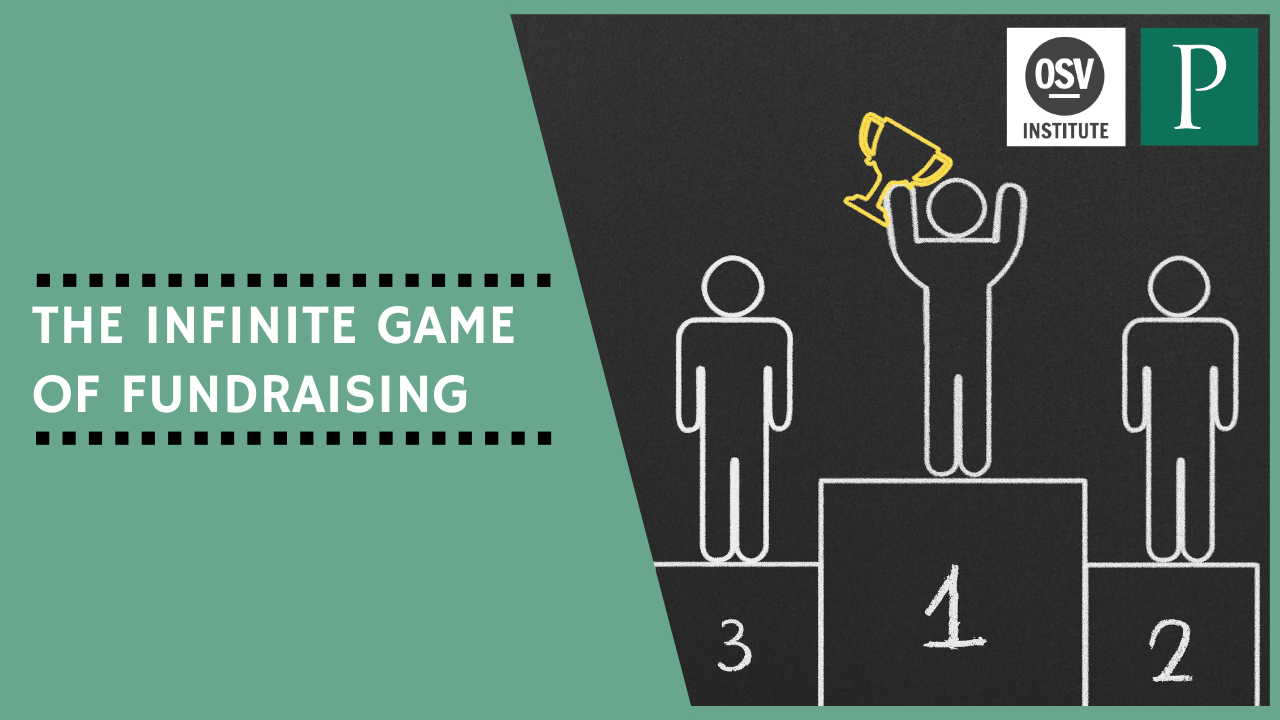The Infinite Game of Fundraising

By Andrew N. Robison, President of Petrus Development and Jason Shanks, President of OSV Institute
“A business that makes nothing but money is a poor business.” - Henry Ford
Toss the ball. Grab some jacks. Move your piece here and chute down the ladder. Have you ever considered the fact that life is a game? Do you ever feel like you are in a big game of checkers? Or Don’t Break the Ice?
And what about other aspects of life? Is the world of business a game--with winners and losers? Is ministry a game? Were Saints Benedict and Dominic playing a game? Or Mary and Martha?
In his book, The Infinite Game, Simon Sinek explains that we are all playing a game...in ministry, in business and in life. But what type of game are we playing? According to Sinek, there are two types of games: finite and infinite games. So what is the difference?
THE FINITE AND THE INFINITE GAME
Finite games, like football and chess, have winners and losers. The rules of the game are known to both sides, the boundaries of the playing field are well-defined. The scoreboard keeps track of the game’s activity, and at the end of a prescribed period of time, a winner is declared. It’s neat. It’s clean. Someone wins, someone loses.
Infinite games have no winners or losers. Rules often don’t exist, and if they do, they are fuzzy and open to interpretation. Opponents change frequently, as does the game itself. There are no clear winners or losers in the infinite game. Strategies and decisions are made not to “win the day/quarter/year” but rather to advance a just cause further for the benefit of all parties involved. Players move into and out of the game and see small or incremental wins as major victories toward a better position.
THE GAME OF DEVELOPMENT
So how does this relate to Catholic fundraising?
In many cases, the difference between playing a finite or infinite game is the difference between having an attitude of scarcity and an attitude of abundance. Scarcity leads to feelings of finite resources (donors, money, time, etc) to last us until the end of a finite game. Abundance fills us with the belief that our resources are renewable and the game continues into infinity.
When fundraisers have a finite attitude of scarcity, it fosters the idea that donors have limited funds and we have to do whatever it takes to make sure they give those resources to our organization. Relationships aren’t authentic because we’re “protecting our donors” from other causes or projects that might fuel their passions. Finite-minded development officers lack the confidence and the experience to see beyond their current situation so they react by narrowing their focus to “winning the game today.”
On the flip side, having an infinite attitude of abundance allows fundraisers and nonprofit leaders to focus more on the needs and goals of their individual donors. This creates what we in the business call, “donor-centric fundraising.” Donors are seen as partners in the mission and not as a resource that needs to be mined until it runs out. Communication with our donors comes naturally and easily instead of forced, strategic and mechanical. We get to know our donors and understand their passions. If they make an investment in our ministry, it is because they see themselves as impact-makers.
So this is great in theory, but what does fundraising from a finite perspective actually sound like? How does it manifest in our everyday work?
WHAT IT SOUNDS LIKE
What follows are examples of what you may hear from finite-minded fundraisers versus infinite-minded fundraisers.
Finite Fundraiser:
“I need to raise $___ to hit our budget this year and then I can take it easy. But honestly, I can’t even tell you what that really does for us.
Infinite Fundraiser:
“Our fundraising target is the bare minimum for us to raise because exceeding that will allow us to expand. If we have more money, we can do more of what we are called to and set our ministry up for sustainable growth.”
Finite Fundraiser:
“Our organization doesn’t share donor names with other fundraisers. And there’s no way I’d voluntarily send our donor to support another cause. That just means there’s less money for us.
Infinite Fundraiser:
“I am constantly introducing our donors to other organizations that I think they’d want to support. Philanthropy is never a zero-sum game. If our donors choose to support another cause based on my recommendation, that makes me really happy.”
Finite Fundraiser:
“The ministry staff are just a distraction to my development efforts, except for my pastor. That’s really tough though because he just doesn’t “do fundraising.”
Infinite Fundraiser:
“I strive to cultivate a culture of philanthropy by engaging every member of our staff in fundraising. And even though my director struggles with the technical side of development, he has a heart for our donors so I do everything I can to help him foster new relationships with our benefactors.
Finite Fundraiser:
“We try to spend as little on fundraising as possible. In fact, we don’t spend anything on younger donors because what they give is really insignificant to our bottom line.”
Infinite Fundraiser:
“Investing in development will benefit us long-term because we can build more relationships. And even though they might have limited resources now, young donors are the future of our ministry.”
If we truly are approaching fundraising from an infinite perspective, we understand that development is a ministry that brings Christ to people and people to Christ. Sometimes donors feel compelled to support our organizations, and sometimes they are going to support other causes. Our responsibility is to the donor and not to “closing a gift.”
Regardless of where the donor elects to give, serving as the educator or conduit for the donor provides them with the opportunity to experience transformation and growth in their life, their faith and relationship with God. We approach our work with hope and joy and the understanding that each gift is building the Kingdom and advancing our shared just cause.
WHAT GAME ARE YOU PLAYING
Our God is a God of abundance and eternity. Our just cause is the Word of God that brings everlasting life. He loves each and every one of us and wants nothing but the best for our lives.
Over 1,500 years ago, Saint Benedict pursued holiness for himself and his followers and initiated one of the longest standing contemplative religious congregations in history. Saint Dominic founded the Order of Preachers 800 years ago with a simple commitment to spreading the Word of God to everyone everywhere. By orienting Christians toward eternal life with Christ instead of simply toward an immediate or finite goal, these two disciples of Christ were truly playing an infinite game.
So what kind of ministry are you trying to build? Do you have an attitude of scarcity or abundance when it comes to development? Are you playing the game to win today or win in eternity?
Today, we challenge you to place your trust in God and ask for sustenance, energy, and wisdom to play the infinite game. When you decide to play the infinite game to honor and glorify Him forever, you win, your organization wins, your donors win and ultimately all the people of God will be victorious.
Andrew N. Robison is President of Petrus Development. He has worked for over 15 years in development roles in Catholic campus ministry, higher education and academic medicine. Through Petrus, Andrew now works with organizations of all sizes to build sustainable development programs that allow them to expand their mission and better serve their constituencies.
About Petrus Development:
In 2005, Petrus Development was founded to help Catholic campus ministries build sustainable development programs. Since then, the Petrus Team has worked with over 150 Catholic ministries and raised over $500M for campus ministries, high schools, universities, pro-life causes and more. Petrus is driven by a simple ideal...MINISTRIES WITH MORE MONEY CAN ACCOMPLISH MORE. If your ministry needs help launching or growing your fundraising efforts, we should talk. The Church needs you to do more.
Jason Shanks brings a wealth of background and experience to his role as President of OSV Institute, overseeing the annual OSV Innovation Challenge and OSV Innovation Talks, both launched to ignite creativity and entrepreneurship in the Catholic Church. His vision for renewal through innovation is unparalleled and stems from his conviction that the Church is evergreen from generation to generation and must be re-presented fresh and anew to today’s modern world.
About OSV Institute:
In 1915, Fr. John Francis Noll began the OSV Institute to extend the reach of Our Sunday Visitor in service and support of Catholic organizations. With over $80 million returned to Catholic organizations to date, the OSV Institute continues to serve the Church by supporting and encouraging innovative and effective Church-related programs and activities. Three areas of special interest for funding are Re-Captivating Millennials, Hispanic Experience and Supporting Parents. In 2017 the Institute expanded its reach to provide support for new innovation and to serve as an incubator for new efforts supporting the Catholic Church. Learn more at www.osvinstitute.com.
READY TO BECOME A BETTER FUNDRAISER?
Sign up below to receive tools, ideas, and inspiration to take your development efforts to the next level.
We hate SPAM. We will never sell your information, for any reason.


